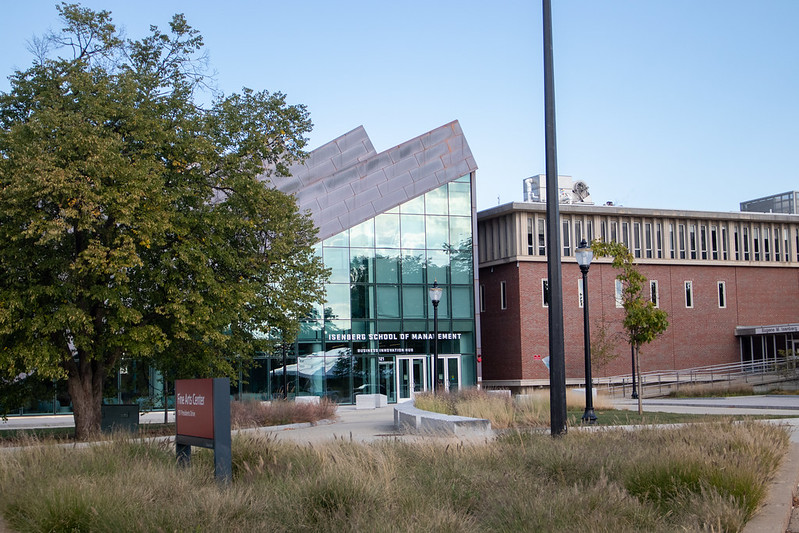On Monday, Feb. 12, the University of Massachusetts Isenberg School of Management (ISOM) held a panel titled “Kyiv School of Economics (KSE) – a University in Wartime.” The event, coordinated by Anna Nagurney, the Eugene M. Isenberg Chair of Integrative Studies at ISOM and member of the International Academic Board at KSE, featured a conversation with the president of KSE, Tymofiy Mylovanov
Mylovanov said had to make three main decisions about his role in life when the war started: if he should leave, what to do about his family and what to do professionally. Additionally, he was deciding between his two jobs: presidential advisor and head of KSE. Deciding that he was not a military man and did not want to be a burden in the office, and that KSE needed him now more than ever, he recalls thinking that “If I don’t work with KSE it will be gone, there will be no university.”
Mylovanov has had a diverse career, serving as deputy chairman of the National Bank of Ukraine for three years, minister of economic development for trade and agriculture of Ukraine for a year and as an advisor to the head of the presidential office of Ukraine. He earned his Ph.D. in 2004 from the University of Wisconsin-Madison and has taught at several U.S. universities. He was recognized as a top economist in 2014 and 2015 by Forbes Ukraine. Now, he leads the Kyiv School of Economics, which has grown from a graduate program in economics to a top Ukrainian university and business school.
At first, like many people in Ukraine, the university board that includes Mylovanov didn’t think a war would actually happen. Although they had prepared for a possible war, they didn’t really believe it would occur. “You can theorize all you want,” he said, “but you can’t prepare.” Immediately when the war started, the board of KSE voted on whether to relocate from Kyiv, or Ukraine as a whole. “We voted not to relocate as long as Kyiv stands, and not to relocate from Ukraine as long as Ukraine stands as a state.”
After deciding to stay in country during the war, the university added board members from other countries in the case the Ukrainian members were killed, and switched to online classes, being the only university in Kyiv to do so in the first year of the war.
The university took various measures to make sure that their students were safe at all times, including checking in on each student individually twice a day by calling in the morning and evening to know they are well.
Mylovanov did not tell members of the university what to do; instead he allowed them to decide what is best for themselves. Some students unenrolled because they do not intend to return to Ukraine, while others fled the country or decided to fight in the military.
“If you want to join the military or do military effort or defense efforts, do it. But otherwise take care of your family, get to safety, get to internet, get a computer and check in,” Mylovanov said. “We’ll give you a task to do because you are analysts, you’re academics, you’re faculty, you’re thinkers, you’re not first responders.”
Mylovanov spoke with great passion about the determination and resilience of the Ukrainian people. “I think Ukraine did not fall because everyone just kept doing their job… I’ve seen environments in which systems collapse. But Ukraine didn’t collapse because of that.” He stated that he thinks Russians were counting on Ukraine’s fall, but it didn’t happen because the people kept serving their country. The country never died: trains were running, stores were open and universities were educating no matter what.
Since the start of the war, KSE has added eight new majors, including psychology to help with war trauma, to their programs, and became Ukraine’s number one private university. Mylovanov shared that there has been a 350 percent increase in enrollment in the past two years and an immense increase in donations for the university.
KSE is working to prepare students to rebuild Ukraine by studying sanctions for Ukrainian economic recovery, food security, repatriation and confiscation of assets. Their community has raised over $80 million to help Ukraine’s war efforts and provide medical aid.
KSE’s collaboration with UMass has allowed them to publish numerous publications that they would not have had the opportunity to do in wartime. “We’re very proud of our strategic and very innovative collaboration with UMass,” Mylovanov said.
Four Ukrainian students from KSE — Asta Motrenko, Iryna Horobets, Khrystyna Buryhina and Marharyta Nechytailo — are attending UMass as economics majors and are enrolled in ISOM classes for the 2023-24 academic year through an exchange student scholarship program. Speaking at a previous panel, Nechytailo said, “We are grateful to be here because it will help us in our career and improve our country.”
Mylovanov concluded the discussion by stating that KSE must demonstrate that life is normal and that tomorrow will always be a better day. “The role of the university is to understand the war, not to judge the war,” he said.
Daniella Pikman can be reached at [email protected].



















